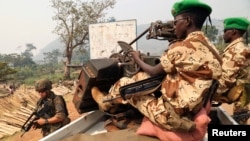ADDIS ABABA —
The African Union says international donors have pledged $314 million to fund an African peacekeeping force in the Central African Republic. The announcement came at the end of a donor conference held at African Union headquarters in Addis Ababa.
Representatives from across Africa and the world have pledged their support for the African-led peacekeeping force known as MISCA.
MISCA soldiers, working alongside French troops in the CAR, are among the only security forces preventing the complete collapse of the country wracked by inter-religious fighting.
Speaking at the donors conference, U.N. Deputy Secretary- General Jan Eliasson said the international community has a responsibility to the people of the CAR to support the mission.
“We must not fail to prevent another huge tragedy in Africa. And we must ensure that MISCA does not fail because we did not give it the support it needs at this critical time,” said Eliasson.
The force has some 5,000 soldiers and aims to reach its full capacity of 6,000 troops by March.
The estimated operational cost of the force is $409 million per year, including police and civilian components, about $100 million more than has been pledged.
Ethiopian Prime Minister Hailemariam Desalegn proposed raising additional funds through assessed contributions from AU members.
“In the spirit of providing African solutions to African problems we should do everything possible to mobilize the necessary support to MISCA so it can effectively carry out its mandate,” he said.
The largest contribution at the conference came from the Central African Economic Community - ECCAS - which pledged $100 million to the force.
The European Union, which is also sending peacekeepers into the country, pledged an additional $33.7 million.
The United States did not announce any new pledges, but outlined more than $175 million it has already contributed to security and humanitarian efforts in the CAR.
Interim CAR Prime Minister Andre Nzapayeke expressed thanks to donors on behalf of the thousands of victims of the crisis and said he would convey the message of solidarity back to the people of his country.
“We Central Africans must help ourselves,” he said, “and commit ourselves to lasting peace in order to merit the strong will expressed here by the international community to help us.”
The head of MISCA said the mission’s greatest needs are logistical support, communications equipment and airlift capacity, which will become particularly crucial for moving troops to areas outside the capital during the coming rainy season.
Representatives from across Africa and the world have pledged their support for the African-led peacekeeping force known as MISCA.
MISCA soldiers, working alongside French troops in the CAR, are among the only security forces preventing the complete collapse of the country wracked by inter-religious fighting.
Speaking at the donors conference, U.N. Deputy Secretary- General Jan Eliasson said the international community has a responsibility to the people of the CAR to support the mission.
“We must not fail to prevent another huge tragedy in Africa. And we must ensure that MISCA does not fail because we did not give it the support it needs at this critical time,” said Eliasson.
The force has some 5,000 soldiers and aims to reach its full capacity of 6,000 troops by March.
The estimated operational cost of the force is $409 million per year, including police and civilian components, about $100 million more than has been pledged.
Ethiopian Prime Minister Hailemariam Desalegn proposed raising additional funds through assessed contributions from AU members.
“In the spirit of providing African solutions to African problems we should do everything possible to mobilize the necessary support to MISCA so it can effectively carry out its mandate,” he said.
The largest contribution at the conference came from the Central African Economic Community - ECCAS - which pledged $100 million to the force.
The European Union, which is also sending peacekeepers into the country, pledged an additional $33.7 million.
The United States did not announce any new pledges, but outlined more than $175 million it has already contributed to security and humanitarian efforts in the CAR.
Interim CAR Prime Minister Andre Nzapayeke expressed thanks to donors on behalf of the thousands of victims of the crisis and said he would convey the message of solidarity back to the people of his country.
“We Central Africans must help ourselves,” he said, “and commit ourselves to lasting peace in order to merit the strong will expressed here by the international community to help us.”
The head of MISCA said the mission’s greatest needs are logistical support, communications equipment and airlift capacity, which will become particularly crucial for moving troops to areas outside the capital during the coming rainy season.




